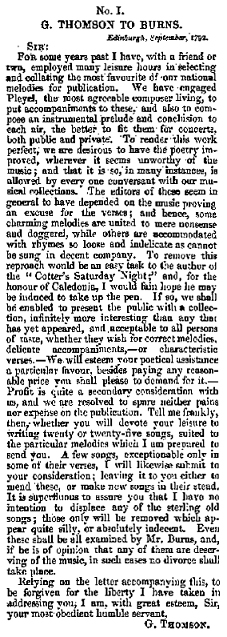b. Fife 1757, d.1851.
Scottish folksong editor and publisher. For 59 years he worked for the Board of Trustees for the Encouragement of Art and Manufactures in Scotland. Joined the Edinburgh Musical Society, played the violin in the orchestra and sang in the choir.
He developed an interest in Scottish folksongs set to classical arrangements and about 1791 he decided to publish a comprehensive collection for voice and piano trio, by the most renowned European composers. This cost a great deal of his private money and was not complete until 1841. Haydn was engaged to arrange folksongs and these were published in 1792 and 1795. Pleyel arranged other tunes and the first part of the “Select Collection of Scottish Airs” was published in 1793.
From the Preface:
“The Symphonies and Accompaniments next engaged his solicitude. For the composition of these, he entered into terms with Mr Pleyel, who fulfilled part of his engagement satisfactorily; but having then stopt short, the Editor found it necessary to turn his eyes elsewhere. He was so fortunate, however, as to engage Mr Kozeluch, and afterwards Dr Haydn, to proceed with the Work, which they have finished in such a manner as to leave him nothing to regret on Mr Pleyel’s breach of engagement…”
Beethoven, Weber, Hummel and Bishop were also involved, Beethoven writing 126 settings and Haydn 187.
As mentioned above, this was not a cheap undertaking and, sadly, cannot be deemed a musical success, the Scottish folksong being largely of an alien nature to the arrangers, and if, as claimed in the Preface, Haydyn tackled the work con amore, Beethoven was angered by the simplification of his piano accompaniments to suit the demands and abilities of the drawing-room market. Indeed, he later refused George Thomson’s approaches to write chamber music, incorporating Scottish folktunes, pricing himself out of the publisher’s means.
As to the words of the songs, Thomson engaged Burns, Scott, James Hogg and others to rewrite songs to remove anything that might shock, presumably again pandering to the tastes of the lucrative drawing-room, polite society market, and the result is, not unexpectedly, rather unsatisfactory.
There are about 300 songs in six folio volumes, published between 1793 and 1841.
Now see where Caledonia’s Genius mourns, And plants the holly round the tomb of Burns.
Other noteworthy publications, most of them also to be found in the Wighton Collection, are collections of Welsh and Irish Airs and a cantata by Sir Henry Bishop, based on “The Jolly Beggars” by Burns.
Of passing interest, George Thomson’s grand-daughter married Charles Dickens in 1836.
Collection of the Songs of Burns, Sir Walter Scott. Bart., and other Eminent Lyric Poets, Ancient and Modern, united to the select melodies of Scotland and of Ireland and Wales, with symphonies and accompaniments for the pianoforte, by Pleyel, Haydn, Beethoven, etc.
6 vols. in 2.
Microfiche available.
A Select Collection of Original Scottish Airs for the Voice; with symphonies and accompaniments for the pianoforte, violin and violoncello, above 100 of the number composed by Haydn, the others by Pleyel, Beethoven, Weber, etc., the poetry chiefly by Burns, the whole collection by G. Thomson, F.A.S.E.
6 vols. in 3.
The Jolly Beggars, a cantata by Burns, set to music, with accompaniments for the pianoforte by Henry R. Bishop
A Select Collection of Original Welsh Airs adapted for the voice, united to characteristic English poetry, never before published, with symphonies and accompaniments, composed chiefly by Joseph Haydn.
“The Orpheus Caledonius” seems to have been the earliest collection in which the favourite Scottish Airs appeared in conjunction with the Songs. It was published about the year 1725, by W. Thomson, London, who republished it, and added a second volume in 1733.
The “Tea-Table Miscellany”, published by the celebrated Allan Ramsay, in 1724 was the first general collection in which the admired Scottish Songs appeared without the Airs, though the poet had brought forward a smaller publication of the Songs some years before. In a separate Work, consisting of six very small books,he also published about 70 of the Airs, with a Bass to each, but whether at the same time with his Miscellany, or after the appearance of “Orpheus Caledonius”, is uncertain.
To the Miscellany, however, the publisher of the “Orpheus Caledonius”, as well as every succeeding Publisher, has been particularly obliged, —most of the songs which have so long been favourites, being found in the Miscellany. These were chiefly written by Ramsay and his friends, for such Scottish Airs as they thought ill-suited with the words, —Airs which must have been popular long before 1724, were collected by Ramsay; and, but for him, it is probable that these admirable specimens of the Native Song of Scotland would have been irretrievable. When, or by whom these were written, was not known even in 1724, from which a considerable antiquity may fairly be inferred; and it is to be presumed that the Airs were at least coeval with the Songs—For the satisfaction of the curious, all the Airs in this Work, which were considered to be old in 1724, are marked in the Index to each volume, as are those known to be modern. Those without any mark are presumed to be modern, though some of them may perhaps be old.
York-Place, Edinburgh, September 1803.

